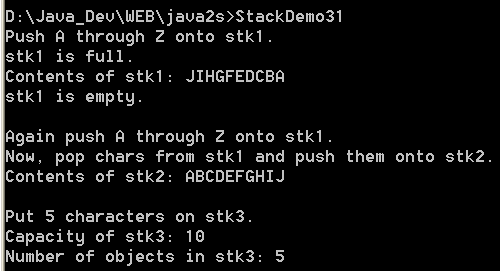A stack class for characters

/*
C#: The Complete Reference
by Herbert Schildt
Publisher: Osborne/McGraw-Hill (March 8, 2002)
ISBN: 0072134852
*/
// A stack class for characters.
using System;
class Stack {
// these members are private
char[] stck; // holds the stack
int tos; // index of the top of the stack
// Construct an empty Stack given its size.
public Stack(int size) {
stck = new char[size]; // allocate memory for stack
tos = 0;
}
// Push characters onto the stack.
public void push(char ch) {
if(tos==stck.Length) {
Console.WriteLine(" -- Stack is full.");
return;
}
stck[tos] = ch;
tos++;
}
// Pop a character from the stack.
public char pop() {
if(tos==0) {
Console.WriteLine(" -- Stack is empty.");
return (char) 0;
}
tos--;
return stck[tos];
}
// Return true if the stack is full.
public bool full() {
return tos==stck.Length;
}
// Return true if the stack is empty.
public bool empty() {
return tos==0;
}
// Return total capacity of the stack.
public int capacity() {
return stck.Length;
}
// Return number of objects currently on the stack.
public int getNum() {
return tos;
}
}
// Demonstrate the Stack class.
public class StackDemo31 {
public static void Main() {
Stack stk1 = new Stack(10);
Stack stk2 = new Stack(10);
Stack stk3 = new Stack(10);
char ch;
int i;
// Put some characters into stk1.
Console.WriteLine("Push A through Z onto stk1.");
for(i=0; !stk1.full(); i++)
stk1.push((char) ('A' + i));
if(stk1.full()) Console.WriteLine("stk1 is full.");
// Display the contents of stk1.
Console.Write("Contents of stk1: ");
while( !stk1.empty() ) {
ch = stk1.pop();
Console.Write(ch);
}
Console.WriteLine();
if(stk1.empty()) Console.WriteLine("stk1 is empty.\n");
// put more characters into stk1
Console.WriteLine("Again push A through Z onto stk1.");
for(i=0; !stk1.full(); i++)
stk1.push((char) ('A' + i));
/* Now, pop from stk1 and push the element in stk2.
this causes stk2 to hold the elements in
reverse order. */
Console.WriteLine("Now, pop chars from stk1 and push " +
"them onto stk2.");
while( !stk1.empty() ) {
ch = stk1.pop();
stk2.push(ch);
}
Console.Write("Contents of stk2: ");
while( !stk2.empty() ) {
ch = stk2.pop();
Console.Write(ch);
}
Console.WriteLine("\n");
// put 5 characters into stack
Console.WriteLine("Put 5 characters on stk3.");
for(i=0; i < 5; i++)
stk3.push((char) ('A' + i));
Console.WriteLine("Capacity of stk3: " + stk3.capacity());
Console.WriteLine("Number of objects in stk3: " +
stk3.getNum());
}
}
Related examples in the same category